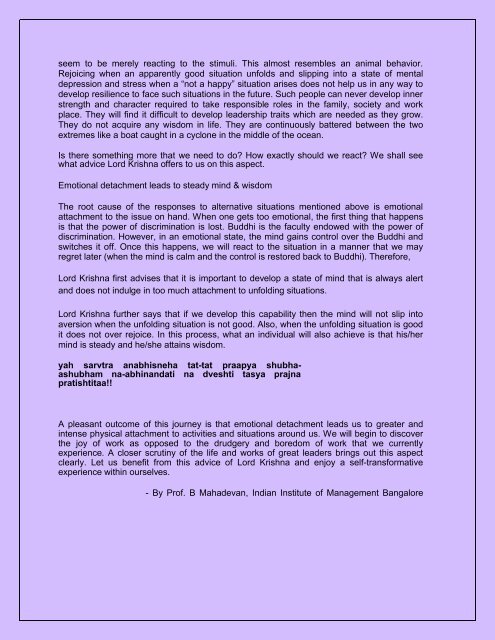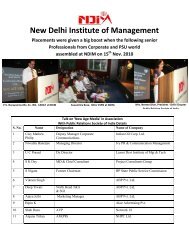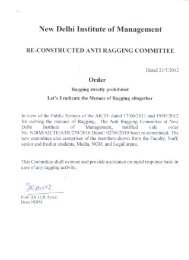Flaunte January 2013 Edition - New Delhi Institute of Management
Flaunte January 2013 Edition - New Delhi Institute of Management
Flaunte January 2013 Edition - New Delhi Institute of Management
Create successful ePaper yourself
Turn your PDF publications into a flip-book with our unique Google optimized e-Paper software.
seem to be merely reacting to the stimuli. This almost resembles an animal behavior.<br />
Rejoicing when an apparently good situation unfolds and slipping into a state <strong>of</strong> mental<br />
depression and stress when a “not a happy” situation arises does not help us in any way to<br />
develop resilience to face such situations in the future. Such people can never develop inner<br />
strength and character required to take responsible roles in the family, society and work<br />
place. They will find it difficult to develop leadership traits which are needed as they grow.<br />
They do not acquire any wisdom in life. They are continuously battered between the two<br />
extremes like a boat caught in a cyclone in the middle <strong>of</strong> the ocean.<br />
Is there something more that we need to do? How exactly should we react? We shall see<br />
what advice Lord Krishna <strong>of</strong>fers to us on this aspect.<br />
Emotional detachment leads to steady mind & wisdom<br />
The root cause <strong>of</strong> the responses to alternative situations mentioned above is emotional<br />
attachment to the issue on hand. When one gets too emotional, the first thing that happens<br />
is that the power <strong>of</strong> discrimination is lost. Buddhi is the faculty endowed with the power <strong>of</strong><br />
discrimination. However, in an emotional state, the mind gains control over the Buddhi and<br />
switches it <strong>of</strong>f. Once this happens, we will react to the situation in a manner that we may<br />
regret later (when the mind is calm and the control is restored back to Buddhi). Therefore,<br />
Lord Krishna first advises that it is important to develop a state <strong>of</strong> mind that is always alert<br />
and does not indulge in too much attachment to unfolding situations.<br />
Lord Krishna further says that if we develop this capability then the mind will not slip into<br />
aversion when the unfolding situation is not good. Also, when the unfolding situation is good<br />
it does not over rejoice. In this process, what an individual will also achieve is that his/her<br />
mind is steady and he/she attains wisdom.<br />
yah sarvtra anabhisneha tat-tat praapya shubhaashubham<br />
na-abhinandati na dveshti tasya prajna<br />
pratishtitaa!!<br />
A pleasant outcome <strong>of</strong> this journey is that emotional detachment leads us to greater and<br />
intense physical attachment to activities and situations around us. We will begin to discover<br />
the joy <strong>of</strong> work as opposed to the drudgery and boredom <strong>of</strong> work that we currently<br />
experience. A closer scrutiny <strong>of</strong> the life and works <strong>of</strong> great leaders brings out this aspect<br />
clearly. Let us benefit from this advice <strong>of</strong> Lord Krishna and enjoy a self-transformative<br />
experience within ourselves.<br />
- By Pr<strong>of</strong>. B Mahadevan, Indian <strong>Institute</strong> <strong>of</strong> <strong>Management</strong> Bangalore













